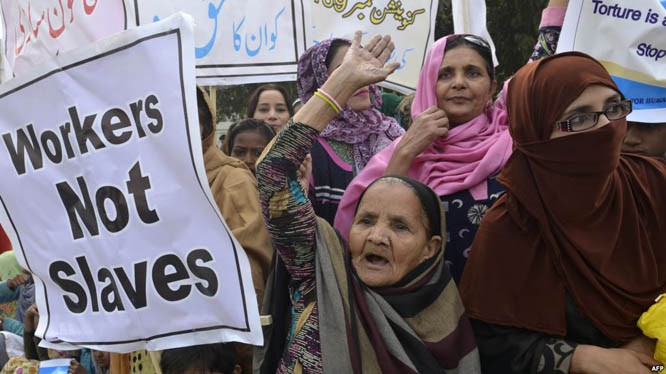
The crackdown on NGOs and INGOs in Pakistan will not only cause unemployment but may also affect business terms with donor countries

Nearly 45,000 non-governmental organisations (NGOs) are working in Pakistan, according to the US-based International Center for Not-for-Profit Law. A report published by the organisation in Sept 2018 states that around 300,000 persons are employed by these NGOs. Besides, there are millions of people benefiting from them indirectly.
The crackdown on INGOs, which was started during the previous government’s tenure and has continued to date, has caused panic among aid workers and all those associated with these organisations.
Prominent INGOs asked to discontinue their projects include Action Aid, Plan International, Marie Stopes, World Vision, Save the Children, Building Resources Across Communities (BRAC), and International Relief and Development.
These organisations have been providing services in the field of education, poverty alleviation, human rights, women’s rights, emergency relief, health, displacement, family planning, child labour, governance, agriculture and others, at a time when the United Nation’s Human Development Index 2018 has placed Pakistan at number 150 among 189 countries after measuring development, educational attainment, life expectancy and income levels.
While talking to TNS, Advisor and Programme Coordinator at Friedrich Ebert Stiftung (FES), Abdul Qadir, expresses his concern. "These organisations are not only building the capacity of local organisations but also giving genuine input in areas of development, human rights, and awareness in the absence of an effective governmental infrastructure."
He says, "the damage will be huge if the government does not revisit its policy of shutting down around two dozen INGOs. Apart from financially supporting thousands of families in Pakistan, these organisations provide a parallel support apparatus to the state."
The Telegraph published a report last month which says that 11 million people would be at risk, especially ordinary families if Pakistan does not reconsider its decision. Between them, the expelled organisations also directly employ more than 1,100 staff in Pakistan.
Pakistan Humanitarian Forum that represents 63 INGOs, including the 18 that have been shut down, says these organisations have committed $124 million funding for this year.
Besides direct donations, the future of local organisations affiliated with these INGOs is at risk. For example, World Vision Pakistan is giving 794,852 children and youth access to education, sustainable income generation, healthcare, and food within their home and communities.
BRAC, based in Bangladesh, has reached out to poor communities in Sindh, Punjab and KP giving them access to schools. International Relief and Development is taking care of 106 child-friendly schools in the flood-affected areas of Sindh.
Plan International’s work focuses on better education, particularly for girls, and helps young people improve their livelihoods. Save the Children has been working in Pakistan for more than 30 years, helping children and families in the aftermath of disasters. Since 1992, ActionAid Pakistan has promoted women’s rights, gender equality, democratic governance, and peace and human security.
Shabnam Rashid, Director at South Asia Partnership, Pakistan (SAP-PK) sees the crackdown on INGOs as curbing the voice of civil society organisations, "The government’s operation is against those working to strengthen democratic institutions, civil society, giving education to the downtrodden and warning against terrorism, radicalisation and sectarianism."
He says SAP-PK has developed a programme called Peace Committee Village Developers and has trained hundreds of girls and boys to promote peace and harmony at the village level. "This reflects the kind of work NGOs are offering to the communities that have been ignored by the state. Unfortunately, these communities would be the direct victims of such policies."
SAFCO Support Foundation (SSF), based in Sindh, is one of the local organisations that is a victim of the current policy. The organisation has sacked 750 employees and are retaining only 10 because of lack of donations. SAFCO gives small interest-free loans to poor families to start their own businesses.
Also read: Editorial
Most of the banned international organisations are based in Europe or directly funded by European countries. The Telegraph claims that diplomats are trying to persuade Islamabad to reverse the ban because these INGOs are important partners of the government.
Pakistani businessmen are apprehensive about this as it may affect the country’s GSP-Plus status granted by the European Union. The GSP PlusGeneral System of Preferences (GSP) facilitates imports from beneficiary countries at lower or no import duty.
Secretary General All Pakistan Textile Mills Association (APTMA), Anis Ul Haq, says while talking to TNS that some INGOs are also working with the textile industry and they want to keep this cooperation going smoothly. "The organisations involved in the textile sector are giving productive input. The government must try to handle the issue of INGOs and GSP-Plus status intelligently otherwise the scale of the damage would be colossal."
Abdul Qadir, advisor to FES, believes that with the closing down of these organisations unemployment will increase, as a large number of people are employed at these think tanks as researchers, etc. "Instead of putting a ban, the government should try to develop a transparent mechanism to register and audit non-governmental organisations," he advises.